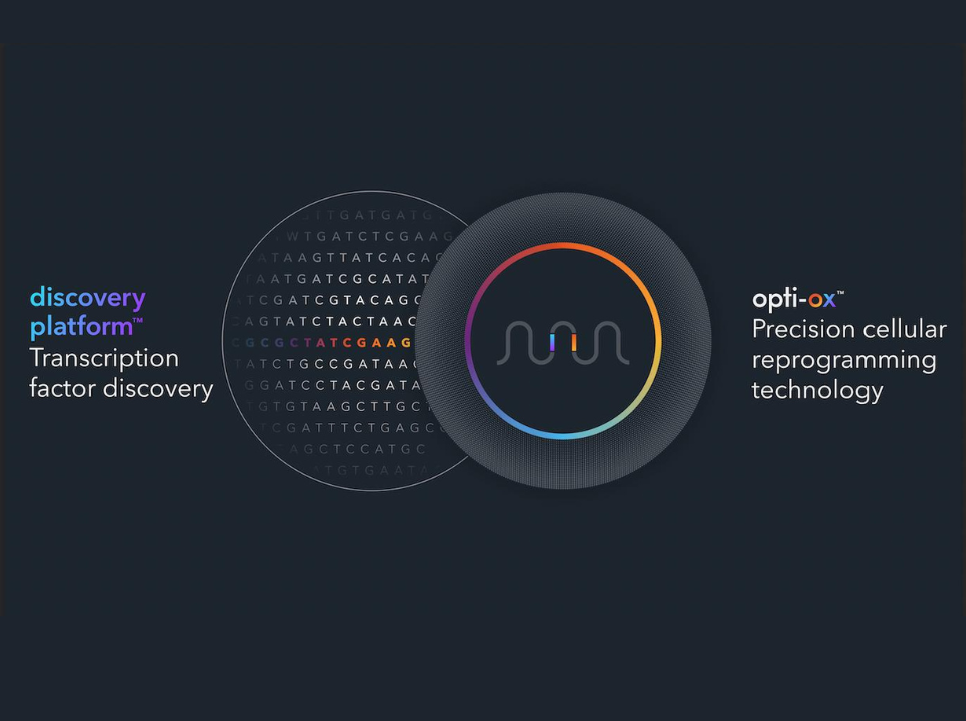26.07.2023 | Published by bit.bio

bit.bio secures foundational United States patent for opti-oxTM, its cell programming technology that uses genomic safe harbour sites
- opti-ox enables the deterministic execution of genetic code in mammalian cells, opening up a wide range of synthetic biology applications
- bit.bio uses opti-ox to power its ioCellsTM product portfolio, providing a consistent source of human cells at industrial scale for the acceleration of research and drug discovery
- opti-ox will also be integral to bit.bio’s proprietary and partnered therapeutic pipeline, with the potential to dramatically lower costs and transform the accessibility of cell therapies
CAMBRIDGE, UK 09:00, 26 July 2023: bit.bio, the company coding human cells for novel cures, has secured a foundational U.S. patent for opti-ox, its precision cell programming and manufacturing technology. opti-ox uses a dual genomic safe harbour approach to cell programming, and the granted U.S. patent covers the use of opti-ox to deterministically activate genetic code in any eukaryotic (cell with a nucleus) cell type.
bit.bio uses opti-ox to drive the rapid transcription factor-mediated conversion of induced pluripotent stem cells (iPSCs) into highly defined cell types in a single step. This can be achieved within days and at industrial scale, while maintaining exceptional purity and unparalleled consistency. The ability to produce defined human cell types with consistency and scale sets new standards in biological research. It also enables large-scale experimentation, such as high-throughput screening in human cells for the discovery and development of new treatments and opens the door to affordable, off the shelf, cell therapies.
Our dual safe harbour approach, opti-ox, is pushing the boundaries of what the field thought was possible when it comes to controlling the biology of human and mammalian cells. It is a foundational toolkit that allows the application of synthetic biology principles to cells of higher species. At bit.bio we are continuing to execute our strategy as we bring the benefits of our technology to the research and drug discovery industries and to the millions of patients that stand to benefit from a transformational approach to cell therapy."
 Mark KotterCo-founder and CEO, bit.bio
Mark KotterCo-founder and CEO, bit.bio
U.S. patent US 11697823, for which bit.bio is the exclusive licensee of Cambridge Enterprise Limited, covers the use of two or more genomic safe harbour sites to control gene expression in eukaryotic cells. Genomic safe harbour sites protect the integrity of the cell and enable faithful activation of transgenes by avoiding gene silencing.
Clonal expansion of opti-ox engineered iPSCs means that they all bear the same inducible program allowing a population of iPSCs to be precisely and consistently reprogrammed into a chosen cell identity at industrial scale. Important data were shared at the recent International Society for Stem Cell Research (ISSCR) conference1 that demonstrate the unrivalled level of precision and consistency of bit.bio’s iPSC-derived ioCells research products, which are all powered by opti-ox.
Furthermore, cells produced using opti-ox technology have already been used in a range of research applications, including the identification of novel targets for neurodegenerative diseases such as Alzheimer’s2,3. They have been used for the generation of biohybrid implant devices aiming to restore paralysed limb function4, and 3D printing of brain models5.
In addition, bit.bio technology licensee Meatable (the Netherlands) is already using opti-ox for the rapid and cost-efficient manufacture of cultured meat, with a stated plan to reach the mass market with a retail launch in 2025.
References
- Data presented by bit.bio at the International Society for Stem Cell Research: https://www.businesswire.com/news/home/20230615394216/en/bit.bio-is-Industrialising-Human-Cell-Manufacturing-Unleashing-the-Potential-of-Synthetic-Biology-for-Reproducible-Research-and-Affordable-Regenerative-Medicines
- Julie Qiaojin Lin, Deepak Khuperkar, Sofia Pavlou, Stanislaw Makarchuk, Nikolaos Patikas, Flora CY Lee, Julia M Zbiegly, Jianning Kang, Sarah F Field, David MD Bailey, Joshua L Freeman, Jernej Ule, Emmanouil Metzakopian, Marc-David Ruepp, Giovanna R Mallucci 2023. HNRNPH1 regulates the neuroprotective cold-shock protein RBM3 expression through poison exon exclusion, The EMBO Journal, 30 May 2023. https://www.embopress.org/doi/full/10.15252/embj.2022113168
- Pavlou, S., Foskolou, S., Patikas, N. et al 2023. CRISPR-Cas9 genetic screen leads to the discovery of L-Moses, a KAT2B inhibitor that attenuates Tunicamycin-mediated neuronal cell death. Nature Scientific Reports 13, 3934 2023. https://www.nature.com/articles/s41598-023-31141-6
- Amy E. Rochford, Alejandro Carnicer-Lombarte, Malak Kawan, Amy Jin, Sam Hilton, Vincenzo F. Curto, Alexandra L. Rutz, Thomas Moreau, Mark R.N. Kotter, George G. Malliaras and Damiano G Barone 2023. Functional neurological restoration of amputated peripheral nerve using biohybrid regenerative bioelectronics, Science Advances, 22 Mar 2023, Vol 9, Issue 12, https://www.science.org/doi/10.1126/sciadv.add8162#
- Zhou, L., Wolfes, A.C., Li, Y., Chan, D.C., Ko, H., Szele, F.G. and Bayley, H., 2020. Lipid‐bilayer‐supported 3D printing of human cerebral cortex cells reveals developmental interactions. Advanced Materials, 32(31), p.2002183. https://onlinelibrary.wiley.com/doi/10.1002/adma.202002183